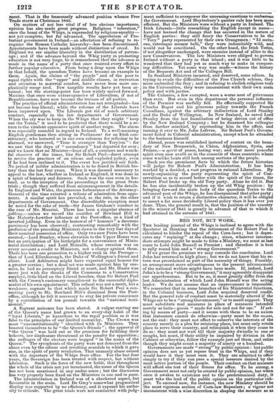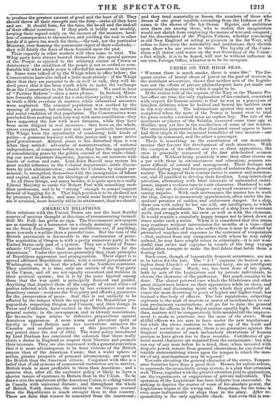BEG NOT, BUT WORK.
THE leading journal of the Whigs is inclined to agree with the Spectator in thinking that the retirement of Sir Robert Peel is calculated to hinder the repeal of the Corn-laws ; but it depre- cates any " repining" at the change ; since, whatever interme- diate attempts might be made to form a Ministry, we must at last come to Lord John Russell as Premier ; and therefore it is best to rally round him and a "strong Government." If we grant the premises we may concede the conclusion. Lord John has returned to high place; but we do not know that his re- turn was preordained as part of the necessity of things. Possibly, an arrangement more advantageous to the present advancement. of the national welfare might have been made. If, indeed, Lord John's is to be a "strong Government," it may agreeably disappoint our apprehensions. But to be so, it must greatly differ from the last Administration of which Lord John Russell was the acting leader. We do not assume that an improvement is impossible. We remember that in some branches of his Ministerial functions, in the Colonial business, Lord John acquired deserved credit. But the general rule of conduct must be materially altered if the Whigs are to be a "strong Government," or to merit support. Tbey must substitute real measures in place of measures intended merely as baits—goods " made for sale and not for use." If act- ing by means of party—and it seems with them to be an axiom that statesmen cannot do otherwise—party must be the means, not the end: they must not affect to subserve the interests of the country merely as a plea for retaining place, but must only retain place to serve their country, and relinquish it when they cease to do so : they must not wait till their majority dwindle to one or nought, but must, if their utility be impaired by division in the Cabinet or otherwise, follow the example just set them, and retire though they might count a majority of ninety or a hundred. Governments are made " strong" by public opinion : but public opinion does not as yet repose trust in the .% hig.s, and if they would have it they must earn it. They are admitted to office simply to try if they can pass a special measure desired by the most active portion of the people. Their conduct on that measure will afford one test of their fitness for office. To be strong, a Government must not only be created by public opinion, but when once it awakes to existence and to the predetermined duty, it must take the lead of the public opinion on the particular sub- ject. To succeed now, for instance, the new Ministry should be the most vigorous section of Corn-law Repealers ; a vigour not inconsistent with a wise discretion in shaping the measure eo as
to produce the greatest amount of good and the least of ill. They should throw all their strength into the duty—stake all they have and are. It should form, for the time, the be-all and the end-all of their official existence. If they push it boldly and steadily, keeping their regard solely on the success of the measure, heed- less of consequences to themselves, and yielding the task to other hands if it prove too much for them,—the task, not the particular Ministry, ever forming the paramount object of their solicitude,— they will falsify the fears of them founded upon the past. Their capacity in other matters will then come to trial. The Whig party have always boasted themselves the special patrons of the People as opposed to the arbitrary claims of Crown or Aristocracy : the condition of the people is not so settled or com- fortable but what ample scope is afffirded for measures to improve it. Some were talked of by the Whigs when in office before ; the Conservatives have also talked a little more plainly : if the Whigs show that they are prepared to do as well as talk, they will in- deed prove that it has been worth while to make the exchange from the Conservative to the Liberal Ministry. We used to hear of " Further Reform"—then a mere phrase. In Ireland, Minis- ters formerly obtained credit for a conciliatory policy ; which was in truth a little overdone in manner, while substantial measures were neglected. The criminal population was soothed by the opening of prisons, but nothing was done to better the material and social condition of that population. The Conservatives were
lerecluded from making such easy way with mere conciliation: they ave supported the law with more firmness, while they have been more diligent in real measures : they have on the whole, errors excepted, been more just and more positively beneficent. The Whigs have the opportunity of combining both kinds of policy—a generous leniency with firm justice and a more active -good government. Abroad, peace is less disturbed than it was when they retired : advocates of nonintervention, of national independence, of commerce before war, they have the opportunity of consolidating peace by the golden cement of free trade—bind- ing our most impatient disputant, America, to our interests with bands of cotton and corn. Lord John Russell may restore his most useful influence in the Colonial department—settle discon- tents by just administration ; enable the Colonies, by simple per- mission, to strengthen themselves with the immigration of labour and capital, and share in the blessings of unrestricted commerce.
In all these things, and many besides, it is quite open to a really Liberal Ministry to outdo Sir Robert Peel with something more than professions, and to be "strong" enough to compel support instead of begging for it. That high position is to be attaIned not by promises, but deeds; and none would more heartily rejoice to see it attained, more heartily aid in its attainment, than we should.



























 Previous page
Previous page